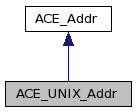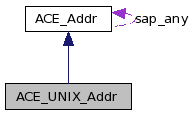Defines the ``UNIX domain address family'' address format. More...
#include <UNIX_Addr.h>


Public Member Functions | |
| ACE_UNIX_Addr (void) | |
| Default constructor. | |
| ACE_UNIX_Addr (const ACE_UNIX_Addr &sa) | |
| Copy constructor. | |
| ACE_UNIX_Addr (const char rendezvous_point[]) | |
| Creates an ACE_UNIX_Addr from a string. | |
| ACE_UNIX_Addr (const sockaddr_un *, int len) | |
| Creates an ACE_INET_Addr from a sockaddr_un structure. | |
| int | set (const ACE_UNIX_Addr &sa) |
| Creates an ACE_UNIX_Addr from another ACE_UNIX_Addr. | |
| int | set (const char rendezvous_point[]) |
| Creates an ACE_UNIX_Addr from a string. | |
| int | set (const sockaddr_un *, int len) |
| Creates an ACE_UNIX_Addr from a sockaddr_un structure. | |
| virtual void * | get_addr (void) const |
| Return a pointer to the underlying network address. | |
| virtual void | set_addr (void *addr, int len) |
| Set a pointer to the underlying network address. | |
| virtual int | addr_to_string (ACE_TCHAR addr[], size_t) const |
| Transform the current address into string format. | |
| virtual int | string_to_addr (const char addr[]) |
| Transform the string into the current addressing format. | |
| bool | operator== (const ACE_UNIX_Addr &SAP) const |
| Compare two addresses for equality. | |
| bool | operator!= (const ACE_UNIX_Addr &SAP) const |
| Compare two addresses for inequality. | |
| const char * | get_path_name (void) const |
| Return the path name of the underlying rendezvous point. | |
| virtual u_long | hash (void) const |
| Computes and returns hash value. | |
| void | dump (void) const |
| Dump the state of an object. | |
Public Attributes | |
| ACE_ALLOC_HOOK_DECLARE | |
| Declare the dynamic allocation hooks. | |
Private Attributes | |
| sockaddr_un | unix_addr_ |
| Underlying socket address. | |
Defines the ``UNIX domain address family'' address format.
Definition at line 39 of file UNIX_Addr.h.
| ACE_UNIX_Addr::ACE_UNIX_Addr | ( | void | ) |
Default constructor.
Definition at line 73 of file UNIX_Addr.cpp.
: ACE_Addr (AF_UNIX, sizeof this->unix_addr_) { (void) ACE_OS::memset ((void *) &this->unix_addr_, 0, sizeof this->unix_addr_); this->unix_addr_.sun_family = AF_UNIX; }
| ACE_UNIX_Addr::ACE_UNIX_Addr | ( | const ACE_UNIX_Addr & | sa | ) |
Copy constructor.
Definition at line 102 of file UNIX_Addr.cpp.
| ACE_UNIX_Addr::ACE_UNIX_Addr | ( | const char | rendezvous_point[] | ) |
Creates an ACE_UNIX_Addr from a string.
Definition at line 144 of file UNIX_Addr.cpp.
{
this->set (rendezvous_point);
}
| ACE_UNIX_Addr::ACE_UNIX_Addr | ( | const sockaddr_un * | un, | |
| int | len | |||
| ) |
Creates an ACE_INET_Addr from a sockaddr_un structure.
Definition at line 119 of file UNIX_Addr.cpp.
{
this->set (un, len);
}
| int ACE_UNIX_Addr::addr_to_string | ( | ACE_TCHAR | addr[], | |
| size_t | len | |||
| ) | const [virtual] |
Transform the current address into string format.
Definition at line 50 of file UNIX_Addr.cpp.
{
ACE_OS::strsncpy (s,
ACE_TEXT_CHAR_TO_TCHAR (this->unix_addr_.sun_path),
len);
return 0;
}
| void ACE_UNIX_Addr::dump | ( | void | ) | const |
Dump the state of an object.
Reimplemented from ACE_Addr.
Definition at line 65 of file UNIX_Addr.cpp.
{
#if defined (ACE_HAS_DUMP)
#endif /* ACE_HAS_DUMP */
}
| void * ACE_UNIX_Addr::get_addr | ( | void | ) | const [virtual] |
Return a pointer to the underlying network address.
Reimplemented from ACE_Addr.
Definition at line 32 of file UNIX_Addr.cpp.
{
return (void *) &this->unix_addr_;
}
| const char * ACE_UNIX_Addr::get_path_name | ( | void | ) | const |
Return the path name of the underlying rendezvous point.
Definition at line 50 of file UNIX_Addr.inl.
{
return this->unix_addr_.sun_path;
}
| u_long ACE_UNIX_Addr::hash | ( | void | ) | const [virtual] |
Computes and returns hash value.
Reimplemented from ACE_Addr.
Definition at line 59 of file UNIX_Addr.cpp.
{
return ACE::hash_pjw (this->unix_addr_.sun_path);
}
| bool ACE_UNIX_Addr::operator!= | ( | const ACE_UNIX_Addr & | SAP | ) | const |
Compare two addresses for inequality.
Definition at line 42 of file UNIX_Addr.inl.
{
return !((*this) == sap); // This is lazy, of course... ;-)
}
| bool ACE_UNIX_Addr::operator== | ( | const ACE_UNIX_Addr & | SAP | ) | const |
Compare two addresses for equality.
Definition at line 32 of file UNIX_Addr.inl.
{
return ACE_OS::strncmp (this->unix_addr_.sun_path,
sap.unix_addr_.sun_path,
sizeof this->unix_addr_.sun_path) == 0;
}
| int ACE_UNIX_Addr::set | ( | const sockaddr_un * | un, | |
| int | len | |||
| ) |
Creates an ACE_UNIX_Addr from a sockaddr_un structure.
Definition at line 109 of file UNIX_Addr.cpp.
{
(void) ACE_OS::memset ((void *) &this->unix_addr_, 0,
sizeof this->unix_addr_);
this->unix_addr_.sun_family = AF_UNIX;
ACE_OS::strcpy (this->unix_addr_.sun_path, un->sun_path);
this->base_set (AF_UNIX, len);
return 0;
}
| int ACE_UNIX_Addr::set | ( | const ACE_UNIX_Addr & | sa | ) |
Creates an ACE_UNIX_Addr from another ACE_UNIX_Addr.
Definition at line 84 of file UNIX_Addr.cpp.
{
if (sa.get_type () == AF_ANY)
(void) ACE_OS::memset ((void *) &this->unix_addr_,
0,
sizeof this->unix_addr_);
else
ACE_OS::strcpy (this->unix_addr_.sun_path,
sa.unix_addr_.sun_path);
this->unix_addr_.sun_family = AF_UNIX;
this->base_set (sa.get_type (), sa.get_size ());
return 0;
}
| int ACE_UNIX_Addr::set | ( | const char | rendezvous_point[] | ) |
Creates an ACE_UNIX_Addr from a string.
Definition at line 125 of file UNIX_Addr.cpp.
{
(void) ACE_OS::memset ((void *) &this->unix_addr_,
0,
sizeof this->unix_addr_);
this->unix_addr_.sun_family = AF_UNIX;
(void) ACE_OS::strsncpy (this->unix_addr_.sun_path,
rendezvous_point,
sizeof this->unix_addr_.sun_path);
this->ACE_Addr::base_set (AF_UNIX,
sizeof this->unix_addr_ -
sizeof (this->unix_addr_.sun_path) +
ACE_OS::strlen (this->unix_addr_.sun_path));
return 0;
}
| void ACE_UNIX_Addr::set_addr | ( | void * | addr, | |
| int | len | |||
| ) | [virtual] |
Set a pointer to the underlying network address.
Reimplemented from ACE_Addr.
Definition at line 19 of file UNIX_Addr.cpp.
{
ACE_TRACE ("ACE_UNIX_Addr::set_addr");
this->ACE_Addr::base_set (AF_UNIX, len);
ACE_OS::memcpy ((void *) &this->unix_addr_,
(void *) addr,
len);
}
| int ACE_UNIX_Addr::string_to_addr | ( | const char | addr[] | ) | [virtual] |
Transform the string into the current addressing format.
Definition at line 40 of file UNIX_Addr.cpp.
{
ACE_OS::strsncpy (this->unix_addr_.sun_path, addr,
sizeof this->unix_addr_.sun_path);
return 0;
}
Declare the dynamic allocation hooks.
Reimplemented from ACE_Addr.
Definition at line 100 of file UNIX_Addr.h.
sockaddr_un ACE_UNIX_Addr::unix_addr_ [private] |
Underlying socket address.
Definition at line 104 of file UNIX_Addr.h.
 1.7.0
1.7.0